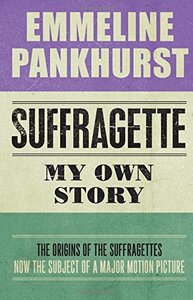Take a photo of a barcode or cover
When I saw this book at a bookstore I jumped in glee. But the reading of the book wasn't so joyful. Although I loved reading a first person account of events that took place more than a 100 years ago, I felt it was slightly monotone. However, I didn't know how many times Pankhurst had been arrested before the WWI and how she was so resilient, to the point of putting herself through such hardships because she knew she was right and her cause, the cause of freedom for women, was right.
Although she became a controversial figure, in the light of today's standard (specially for her attitude towards her daughter), she has to be given credit for hers and her peer's work towards getting the vote for women.
I recommend it as a feminist read, not because it is brilliant and up to date on intersectional feminism, because it teaches you how it all began and how much of militant badasses sufragettes were.
Although she became a controversial figure, in the light of today's standard (specially for her attitude towards her daughter), she has to be given credit for hers and her peer's work towards getting the vote for women.
I recommend it as a feminist read, not because it is brilliant and up to date on intersectional feminism, because it teaches you how it all began and how much of militant badasses sufragettes were.
this is not just a story of one woman its the start of a long hard fought for war for woman to be equal in pay, work and voting and I find her strong and really inspiring, also her courage to go up against a force that is the Government and not be threatened by their horrific brutal reply to their cause. this is not a memoire it is a testimony to all women who struggle for their rights today still.
An interesting memoir/informative recap of the Suffragette movement in the UK. This book made me feel a mix of emotions as I finished it on the same day that my country (The Bahamas) voted against four bills that would bring more gender parity to the constitution.
I listened to the audiobook which was great and I would definitely recommend it. As for the content, while the Suffragettes' struggle for the vote was more physically violent (against the Suffragettes) than I'd previously been aware (violent force feeding for women on hunger strikes in prison, beating women up, etc), I wouldn't say there was a whole lot here that really surprised me or changed my perspective on things or enlightened me to things I didn't have inklings about already, but it provided the exact details and was worth the read. It made me want to know more about Pankhurst's upbringing and her family--particularly her daughters who all seem to have been very political and focussed on justice as their mother.
Interestingly (maybe), when I looked up Asquith (the then Prime Minister and the anti-women's suffrage jerk who was sort one of the main antagonist throughout the movement), I found out his great granddaughter is Helena Bonham-Carter. So there's some trivia for you.
I listened to the audiobook which was great and I would definitely recommend it. As for the content, while the Suffragettes' struggle for the vote was more physically violent (against the Suffragettes) than I'd previously been aware (violent force feeding for women on hunger strikes in prison, beating women up, etc), I wouldn't say there was a whole lot here that really surprised me or changed my perspective on things or enlightened me to things I didn't have inklings about already, but it provided the exact details and was worth the read. It made me want to know more about Pankhurst's upbringing and her family--particularly her daughters who all seem to have been very political and focussed on justice as their mother.
Interestingly (maybe), when I looked up Asquith (the then Prime Minister and the anti-women's suffrage jerk who was sort one of the main antagonist throughout the movement), I found out his great granddaughter is Helena Bonham-Carter. So there's some trivia for you.
The militancy of men, through all the centuries, has drenched the world with blood, and for these deeds of horror and destruction men have been rewarded with monuments, with great songs and epics. The militancy of women has harmed no human life save the lives of those who fought the battle of righteousness. Time alone will reveal what reward will be allotted to the women.
To mark 100 years since some women achieved the vote in the UK, I decided now was the time to read Emmeline Pankhurst's memoir. I was surprised initially by how accessible the writing was, I've struggled previously with novels written around the same time, so that was a pleasant surprise. Pankhurst describes in great detail the circumstances which led her to champion the cause of women's suffrage and the methods used by the Women's Social and Political Union (WSPU) to try and achieve the vote.
I couldn't rate it higher than three stars because there were long stretches that felt quite repetitive and laborious to read, particularly where Pankhurst had effectively transcribed whole speeches she'd made either in public or in court.
However, I can't fault her for going into such detail, because while the repetition wasn't enjoyable to read, it reflected how repetitive their work was. The WSPU had to keep ploughing away at this, doing the same things over and over again. I don't think I'd really appreciated how many times they marched to Westminster just to be able to petition the Government to grant them the vote - and how this was portrayed by the Government and the media as troublemaking, and often resulted in the marchers being assaulted and/or imprisoned. Yes, many will remember their more overt militancy, such as smashing windows and putting bombs in postboxes, and of course Emily Wilding Davison's death, but that was really a result of having all of their more "peaceful" protests ignored and derided by the Government and the press.
Likewise, the tactic of force-feeding women on hunger strike was always appalling in my mind but I hadn't really thought about it in great detail until I read about it, it was truly abhorrent, and makes it all the more incredible that these women were willing to go to such lengths.
I'm not naïve to think that this is an unbiased look at the history of women's suffrage, as Pankhurst is clearly biased on this topic; but I think it's a worthy read to understand more about the motivations and decision-making of these women whose efforts (and lives) may undoubtedly contributed to the achievement of equal suffrage when it finally came.
There can be no real peace in the world until woman, the mother half of the human family, is given liberty in the councils of the world.
I was drawn to this biography by the movie, Suffragette, about which I have mixed feelings. While it was a very good movie and a very important story, I felt very uncomfortable about the choice for a fictional lead character when there were such fantastic real Suffragettes to choose from.
This biography was at times interesting and frustrating. Apart from a brief period of study in school, I don't know much about the Suffrage movement, something I am disappointed about in myself. Unfortunately, Mrs Pankhurst's account was somewhat lacking as a tool of education because she was writing at the time these events were happening and worked off the assumption that most of her readers would have a good grasp of the particulars in their recent memory and her biography would merely clarify some of the particulars.
In this context, her book serves it's purpose quite well. And the record of particular speeches as well as an explanation/defense of the actions and procedures of the W.S.P.U was quite helpful.
However as someone coming in a hundred years after the fact, and lacking a lot of the context, I was disappointed not to have had included some of the information provided by a biographer or social historian which I would have found extremely helpful. There was no real detail of Mrs Pankhurst's personal life story, or more details of some of the key players and events that would have provided greater context and understanding to the events as a whole.
This biography was at times interesting and frustrating. Apart from a brief period of study in school, I don't know much about the Suffrage movement, something I am disappointed about in myself. Unfortunately, Mrs Pankhurst's account was somewhat lacking as a tool of education because she was writing at the time these events were happening and worked off the assumption that most of her readers would have a good grasp of the particulars in their recent memory and her biography would merely clarify some of the particulars.
In this context, her book serves it's purpose quite well. And the record of particular speeches as well as an explanation/defense of the actions and procedures of the W.S.P.U was quite helpful.
However as someone coming in a hundred years after the fact, and lacking a lot of the context, I was disappointed not to have had included some of the information provided by a biographer or social historian which I would have found extremely helpful. There was no real detail of Mrs Pankhurst's personal life story, or more details of some of the key players and events that would have provided greater context and understanding to the events as a whole.



